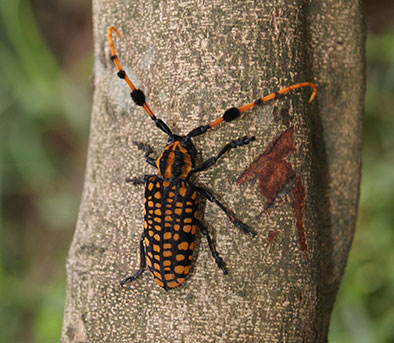[ Prafulla Kaman ]
PASIGHAT, 3 Feb: Scientists have for the first time found evidence of China beetles infesting gooseberry or amla plants in Arunachal.
A study conducted by entomologist Dr MM Kumawat and his colleagues from the CHF found severe infestation of beetle Aristobia reticulator on Amla plants in East Siang district. The study was carried out in 15 orchards in the plain areas.
The study has been published in the latest edition of the Indian Journal of Entomology.
In 2017, Dr Kumawat had first detected the infestation of the beetle on Amla plants in the orchards of the CHF.
In his research paper, Dr Kumawat noted that the Chinese beetles were found feeding on the bark of tender twigs, causing girdling during summer months from June to August.
According to reports, the beetle is a regular pest of litchi and longan trees in China and Myanmar.
Dr Kumawat, who is presently serving in Jodhpur, Rajasthan, said the China beetle may invade neighbouring Assam also and even spread to major litchi and Amla growing states.
Dr L Wangchu, Associate Professor, Fruit Science, CHF, said that this pest might have migrated from China and Myanmar to the northeastern region of India because of its close geographical proximity to those countries.
“Now, it is a threat not only to Arunachal but other major litchi and aonla growing states like Bihar, West Bengal, Uttar Pradesh and Jharkhand, if quarantine measures are not taken,” Dr Wangchu said.
Considering the emerging threat posed by the China beetle, entomologists are conducting extensive research on incidence and bionomics of the insect. Scientific studies revealed that old fruit trees are severely damaged by the China stem borer beetle as numerous larvae were found on a single tree-tunnel. The shoots or branches of 36.1 percent of infested trees died due to heavy tunneling by grubs in xylem tissues.
The China beetle was first reported in guava trees in Meghalaya in 1997, and then in litchi trees in Arunachal in 2015. Dr Kumawat had found the presence of the Chinese beetle on lichi trees in the CHF campus.




